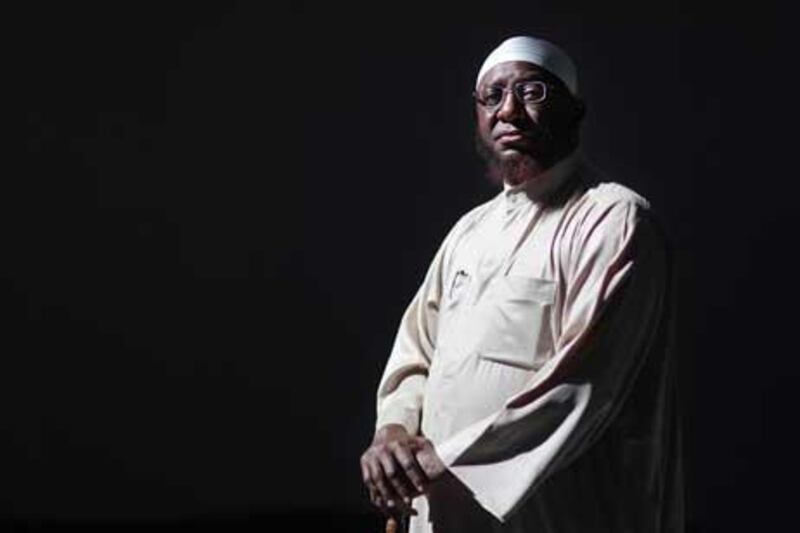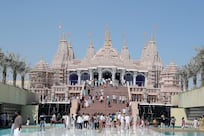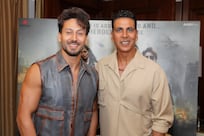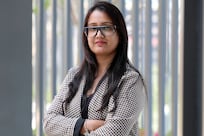SHARJAH // Bilal Abdul Alim has had a colourful journey from growing up in racially divided Texas, converting to Islam and becoming a doctor and TV host in Sharjah.
Born Julius Phillips Jr in 1951, his father a doctor and mother a teacher, he grew up in the racial segregation of the 1950s, waking up to see burning crosses on the lawn set by Ku Klux Klan racists.
Church was a big part of life for the young Julius. His father, a civil-rights activist long before the days of Martin Luther King, was a part-time preacher and founder of the only black hospital serving north Louisiana, the JA Phillips Hospital. He took his young son to church every Sunday. It was only after his father's death that Julius began to question his links to the church.
His first year in college studying chemistry was at the height of the Vietnam war. "I was thrown into this big movement," he says. "Everything was political. There was the rise of the Black Panthers. The focus was political not educational and for a while it made me lose my taste for college and being a doctor."
Before his conversion, he was in a jazz band called Selflessness with a Muslim called Daoud Haroun.
"Sometimes on a cold snowy night we'd sit around and drink camomile tea and look at pictures of Mecca," he says.
"The Muslims I was meeting by this point were more together than the people I'd been hanging out with before in the black power movement."
In his senior year at medical school, he took a class in comparative religion. "From that class, it became clear to me that Islam was the path for me, but I wasn't ready yet."
He says the final push came to him in a dream.
"In my dream, I was told that if I didn't convert, Allah would destroy me. I woke up shaking. The next morning around 6.30am, the phone rang. It was my old roommate from college asking me if I was ready for Islam. He said he'd had a dream too.
"A week later I was driving to Washington DC to be with my best friend and embrace Islam at the Islamic Centre. From that point on, dreams started to guide my life." Soon after, he became Bilal Abdul Alim.
After regular visits to the Muslim world for 10 years to learn more about the faith, in 1991 he decided it was time to leave the US, where he had been practising medicine since graduating from medical school.
Years before, on a spiritual study trip to India, he ran into an acquaintance called Salem, whom he had first met in America when they were students.
Little did he realise that Salem was a member of the ruling family of Sharjah. Only after 12 years, when Dr Alim visited the UAE before starting a job he had been offered in Saudi Arabia, did he find out.
That was 18 years ago and he never left after being offered a job with the Ruler of Sharjah, Sheikh Dr Sultan bin Mohammed Al Qasimi. He was hired to run Sharjah Charity International as a doctor and medical adviser and then to run the Sheikh's personal charity, Sharjah Awqaf General Trust, a job that took him all over the world. At one point, in war-torn Mogadishu, he and his team were treating 1,000 patients a day.
He brought his wife Khadijah and their children here, but Khadijah died after contracting the autoimmune disease lupus. As she was dying, she told him to find another wife to care for him and the couple's three children, who are now grown up.
He has since married two more wives, Hameeda, 37, in 1992 and Mariam, 59, in 1996, and both live with him in the family home in Sharjah with his three youngest children.
"Mariam is the rock of the family," he says. "Everyone relies on her."
But it was Hameeda who saved the doctor's life last year when she donated a kidney to her husband after discovering she was a compatible match.
Hameeda says that it came to her in a dream that she would be a match and did not think twice about giving her husband her kidney. "I was in and out of hospital very quickly," she says. "For me it wasn't such a big deal as it was for Bilal."
Their youngest daughter, Asiyah, 13, says the transplant has changed her father, who had severe diabetes and hypertension, which are now better controlled.
"His face is much brighter and he's much calmer," she says.
Belqis, 15, says: "He has so much more life now and it's changed him in a good way."
He replies: "It gave me a second chance and I thank God every day for this chance."
He has been the face of Sharjah TV's English talk show, Medicine and Islam, for more than nine years, discussing issues such as the benefits of fasting, alternative medicine and Islam, and developments in western medicine.
It is a role that he relishes. It is the only English language show on the station and he is proud of the range of issues he has been able to address, humble about the support he has had from the medical community.
"It brings the best of the East and the West," he says. "It keeps people informed of advances in western medicine and addresses some very important ethical and religious issues such as genetic engineering or IVF and surrogacy."






